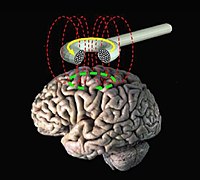
Association of Treatment With Antipsychotics, Antidepressants, or Both With Movement Disorders and Seizures Among Children and Adolescents With Depression in Korea
Sign Up to like & getrecommendations! Published in 2022 at "JAMA Network Open"
DOI: 10.1001/jamanetworkopen.2022.7074
Abstract: Key Points Question Is treatment with antipsychotics in children and adolescents who are taking antidepressant medications associated with neurological adverse events? Findings In this cohort study of 9890 children and adolescents prescribed antidepressants for depression,… read more here.
Keywords: movement disorders; treatment antipsychotics; adolescents depression; disorders seizures ... See more keywords

Association of Genetic Variant Linked to Hemochromatosis With Brain Magnetic Resonance Imaging Measures of Iron and Movement Disorders.
Sign Up to like & getrecommendations! Published in 2022 at "JAMA neurology"
DOI: 10.1001/jamaneurol.2022.2030
Abstract: Importance Hereditary hemochromatosis (HH) is an autosomal recessive genetic disorder that leads to iron overload. Conflicting results from previous research has led some to believe the brain is spared the toxic effects of iron in… read more here.
Keywords: movement disorders; iron deposition; movement; brain magnetic ... See more keywords

Recessive mutations in VPS13D cause childhood onset movement disorders
Sign Up to like & getrecommendations! Published in 2018 at "Annals of Neurology"
DOI: 10.1002/ana.25204
Abstract: VPS13 protein family members VPS13A through VPS13C have been associated with various recessive movement disorders. We describe the first disease association of rare recessive VPS13D variants including frameshift, missense, and partial duplication mutations with a… read more here.
Keywords: movement; recessive mutations; childhood onset; movement disorders ... See more keywords

GIPC1 CGG Repeat Expansion Is Associated with Movement Disorders
Sign Up to like & getrecommendations! Published in 2022 at "Annals of Neurology"
DOI: 10.1002/ana.26325
Abstract: CGG/GGC repeat expansion in FMR1 and NOTCH2NLC is reportedly associated with movement disorders; therefore, we hypothesized that the CGG repeat expansion in LRP12, NUTM2B‐AS1, and GIPC1, which was previously identified in myopathy, might also be… read more here.
Keywords: repeat expansion; movement disorders; associated movement; repeat ... See more keywords

Eye movement disorders in inborn errors of metabolism: A quantitative analysis of 37 patients
Sign Up to like & getrecommendations! Published in 2022 at "Journal of Inherited Metabolic Disease"
DOI: 10.1002/jimd.12533
Abstract: Inborn errors of metabolism are genetic disorders that need to be recognized as early as possible because treatment may be available. In late‐onset forms, core symptoms are movement disorders, psychiatric symptoms, and cognitive impairment. Eye… read more here.
Keywords: movement disorders; movement; inborn errors; errors metabolism ... See more keywords

Are Patients with Psychogenic Movement Disorders More Likely to be Healthcare Workers?
Sign Up to like & getrecommendations! Published in 2017 at "Movement Disorders Clinical Practice"
DOI: 10.1002/mdc3.12351
Abstract: Reported risk factors for the development of a psychogenic movement disorder (PMD) include young age, female gender, history of abuse, current or past psychiatric disorder, lower levels of education and socioeconomic status, and employment as… read more here.
Keywords: movement; patients psychogenic; disorders likely; psychogenic movement ... See more keywords

C9orf72 and its Relevance in Parkinsonism and Movement Disorders: A Comprehensive Review of the Literature
Sign Up to like & getrecommendations! Published in 2018 at "Movement Disorders Clinical Practice"
DOI: 10.1002/mdc3.12677
Abstract: The C9orf72 hexanucleotide expansion is one of the latest discovered repeat expansion disorders related to neurodegeneration. Its association with the FTD/ALS spectrum disorders is well established, and it is considered to be one of the… read more here.
Keywords: c9orf72 relevance; parkinsonism movement; movement; movement disorders ... See more keywords

Cost‐Effectiveness of Deep Brain Stimulation With Movement Disorders: A Systematic Review
Sign Up to like & getrecommendations! Published in 2019 at "Movement Disorders Clinical Practice"
DOI: 10.1002/mdc3.12780
Abstract: Movement disorders (MDs) are increasingly being managed with deep brain stimulation (DBS). High‐quality economic evaluations (EEs) are necessary to evaluate the cost‐effectiveness of DBS. We conducted a systematic review of published EEs of the treatment… read more here.
Keywords: deep brain; cost effectiveness; review; movement disorders ... See more keywords

Some New and Unexpected Tauopathies in Movement Disorders
Sign Up to like & getrecommendations! Published in 2020 at "Movement Disorders Clinical Practice"
DOI: 10.1002/mdc3.12995
Abstract: Tauopathies are a heterogeneous group of neurodegenerative disorders sharing the neuropathologic hallmark of neuronal and/or glial accumulation of tau (Table 1). They can have genetic, toxic, autoimmune, or environmental bases, although in most cases, the… read more here.
Keywords: tau; movement; new unexpected; unexpected tauopathies ... See more keywords

Movement Disorders and Renal Diseases
Sign Up to like & getrecommendations! Published in 2020 at "Movement Disorders Clinical Practice"
DOI: 10.1002/mdc3.13005
Abstract: Movement disorders often emerge from the interplay of complex pathophysiological processes involving the kidneys and the nervous system. Tremor, myoclonus, ataxia, chorea, and parkinsonism can occur in the context of renal dysfunction (azotemia and electrolyte… read more here.
Keywords: movement; renal diseases; management; disorders renal ... See more keywords

The Impact of Diagnosis on Health Care Utilization in Functional Movement Disorders
Sign Up to like & getrecommendations! Published in 2020 at "Movement Disorders Clinical Practice"
DOI: 10.1002/mdc3.13038
Abstract: Patients with functional movement disorders (FMD) are common in neurology clinics with prevalence estimates as high as 30%. Patients with FMD often undergo an arduous, costly diagnostic odyssey. These patients are often considered as having… read more here.
Keywords: functional movement; health care; movement; care utilization ... See more keywords